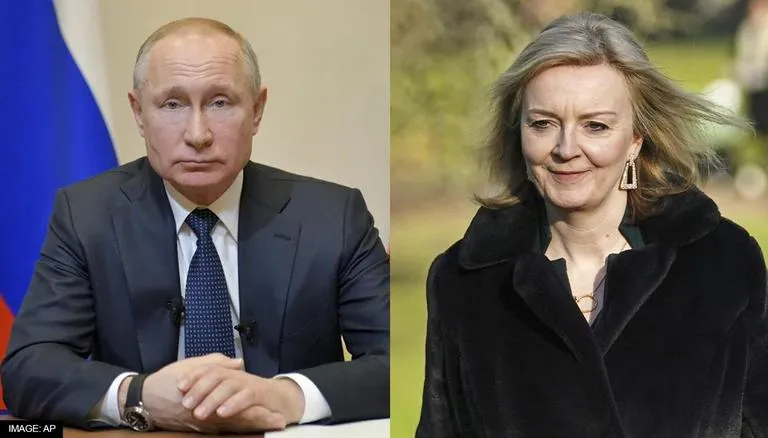
by Ralph Berry
‘In the end we build up a picture of an apostolic succession, in which statesmen move from one muddle to the next display of “the continuity of British foreign policy”.’ (A.J.P. Taylor, The Trouble Makers, p. 12.) A.J.P. Taylor was our first of historians in his era and his field. The current Foreign Secretary, Liz Truss, is on top form as an exponent of her Department’s traditional qualities. She has said, and repeated the message in her Mansion House speech, that the Western allies, including Britain, must ‘double down’ and ‘keep going further and faster’ to ‘push Russia out of the whole of Ukraine.’ I love this word ‘push’, which comes from the finest tradition of English euphemism. It suggests a mere muscular effort, and it means war, bloody and unending. A Guardian comment said it best: ‘Give war a chance.’
Truss, the La Pasionaria of her cause, takes her cue from the Ukrainian leader Zelensky. He writes contemporary history as a libretto, in which he appears as the leading tenor whose solos are an unflinching will to regain Ukraine’s independence, all of it. He calls for a diplomatic solution, at the same time as he rejects any loss of Ukrainian territory. Yet diplomacy must mean concessions on both sides. The Russians are not talking any kind of concession, so ‘diplomacy’ is an empty phrase. Only when Ukraine is beaten to its knees can there be serious talks.
Regional support for Zelensky comes above all from Poland. Andrzej Duda, the first foreign leader to address Ukrainian MPs in person since the start of the war, said: ‘Only Ukraine has the right to make decisions about its future’. That is a remarkable assertion of the right of the individual nation to control its relations with neighbours. It would be too cruel to cite Poland’s rights in September 1939. But then it would be too cruel to cite Britain’s guarantee to Poland in March 1939, a threadbare bluff that Hitler contemptuously called. I do not think that ‘rights’ has any standing in the Russo-Ukrainian war.
The war itself is sliding away from Zelensky. Moldova has at once made it clear that they do not want the weapons that Liz Truss is pressing upon them. They have an established policy of neutrality, and will keep it that way: NATO is not for them, unlike Finland and Sweden who have been panicked into abandoning their historic neutrality. They won’t get what they want any time soon, since Erdogan is withholding Turkey’s consent and will want a stiff price for accepting the new applicants. Russia is making slow but steady progress on the battlefield, and its mightiest weapon is now taking centre stage: wheat. The world shortage of that ancient staple, bread, is now upon us. While Russia is on track for a good harvest, Ukraine has not been able to plant at anything like pre-war levels, and it cannot export the stocks that it has because of the Russian blockade of Odessa. On oil, gas, and wheat Russia holds a first-class hand. This is now ever clearer, and the New York Times in an important article signals a shift in American thinking. President Biden’s support for Ukraine is likely to be more qualified.
The only major leader to have kept his head is President Macron. He has a line to Putin, with whom he speaks, unlike Boris Johnson who is not on speakers with the Russian. This can hardly be a British advantage when the talk eventually moves to diplomacy. Macron has said that peace efforts would not be served by humiliating Russia. ‘The end of the discussion and the negotiations will be set by Ukraine and Russia. But it will not be done in denial, nor in exclusion of each other, nor even in humiliation.’ Macron is right, and he is now reinforced by Henry Kissinger in Davos who revives the balance of power as the supreme value in European politics. As reported by Ambrose Evans-Phillips in today’s Telegraph, he has told the World Economic Forum that Russia had been an essential part of Europe for 400 years and had been the guarantor of the European balance of power structure at critical times. European leaders should not lose sight of the longer term relationship with Russia. The proper role for Ukraine is to be a neutral buffer state rather than the frontier of Europe. ‘I hope the Ukrainians will match the heroism they have shown with wisdom.’
Boris Johnson is exposed as having in Lord Salisbury’s phrase ‘put all our money on the wrong horse’. The Ukraine he backed is a devastated, impoverished and depopulated land, with no victory in sight. Margaret Thatcher, who hated the Foreign Office, would have been scathing on its recent performance. They have failed to rein in the extravagant overbids of Liz Truss, who still, with one of the pleasing histories with which history abounds, operates from Palmerston’s grand desk. I daresay that Carlton House, the superb residence of the Foreign Office, will oversee plausibly the coming change of policy. It is their metier, as A.J.P. Taylor said. I do not foresee the same continuity in the fortunes of the Prime Minister.
- Like
- Digg
- Del
- Tumblr
- VKontakte
- Buffer
- Love This
- Odnoklassniki
- Meneame
- Blogger
- Amazon
- Yahoo Mail
- Gmail
- AOL
- Newsvine
- HackerNews
- Evernote
- MySpace
- Mail.ru
- Viadeo
- Line
- Comments
- Yummly
- SMS
- Viber
- Telegram
- Subscribe
- Skype
- Facebook Messenger
- Kakao
- LiveJournal
- Yammer
- Edgar
- Fintel
- Mix
- Instapaper
- Copy Link








